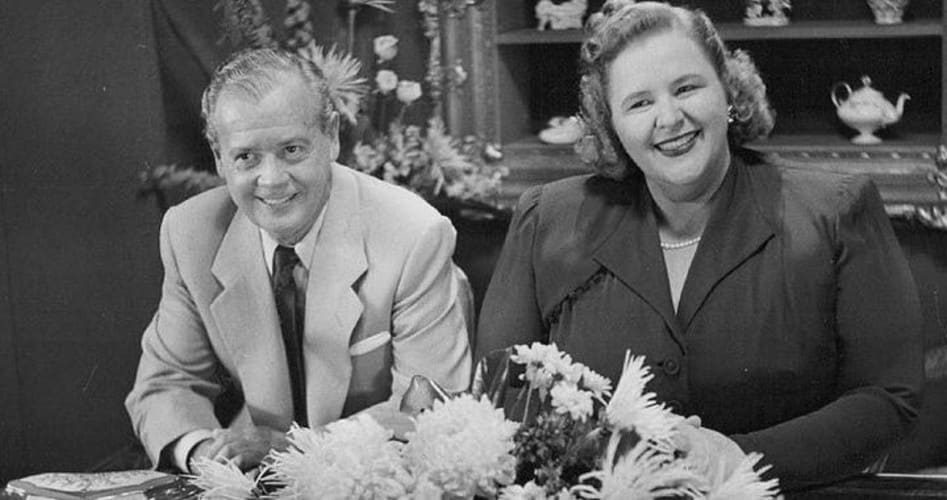
For decades belt-it-out popular singer Kate Smith (shown on right) was considered the embodiment of the uniquely American cultural phenomenon that combines wholesome entertainment with patriotism and love of country. Smith’s rendition of Irving Berlin’s classic “God Bless America,” which she first recorded in 1939, turned the song into a patriotic anthem that has inspired generations of Americans.
But Smith, who enjoyed a 50-year career and the esteem of fans all over the world before her death in 1986, has become the latest target of PC gumshoes ever on the lookout for evidence that individuals either past and present have been guilty of supposedly racist, homophobic, sexist, or other socially unacceptable thoughts, attitudes, or actions.
In Smith’s case, someone somewhere dug up a couple of long-forgotten songs she recorded back in the 1930s which, by just about anyone’s interpretation would be considered, in today’s enlightened society, to be racist. “One of them,” reported CNN, “is her 1931 rendition of ‘That’s Why Darkies Were Born,’ which has lyrics that read: ‘Someone had to pick the cotton, / Someone had to plant the corn,/ Someone had to slave and be able to sing, / That’s why darkies were born.’” The other, recalled CNN, is Smith’s 1933 recording of “Pickaninny Heaven,” in which “colored children” in an orphanage are encouraged to dream about a magical place that grows “great big watermelons.”
The revelation of these songs in Smith’s recording catalogue prompted the Philadelphia Flyers NHL hockey club to unceremoniously remove a statue of the beloved signer that had stood outside the team’s arena for more than three decades, and to halt the playing of her rendition of “God Bless America.” CNN noted that “Smith is closely tied to the [Flyers] because she performed ‘God Bless America’ before Flyers games in the 1970s.” The team erected the statue to honor Smith a year after her death in 1986.
The move by the Flyers came a day after the New York Yankees announced they would stop playing Smith’s rendition of “God Bless America” during the seventh-inning stretch at Yankee Stadium, something, reported the Associated Press, the team had done since the 9/11 attacks in 2001 that killed nearly 3,000 people and destroyed the twin towers of NYC’s World Trade Center.
In its statement the Flyers organization said that its owners had “recently become aware that several songs performed by Kate Smith contain offensive lyrics that do not reflect our values as an organization. As we continue to look into this serious matter, we are removing Kate Smith’s recording of ‘God Bless America’ from our library and covering up the statue that stands outside of our arena.”
In its own statement, the Yankees organization said that it takes “social, racial, and cultural insensitivities very seriously. And while no final conclusions have been made, we are erring on the side of sensitivity.”
In response, members of Smith’s family said they were saddened by what they see as a “misguided” reaction to just two of the thousands of songs that Smith recorded during her career. Smith’s niece, Suzy Andron, who helped care for Smith in her final days, told USA Today that she strongly objected to the portrayal of the singer as racist, and was “saddened that a woman who has been dead for almost 35 years would be attacked in this way.” She insisted that her aunt “didn’t see a person’s color. She was very in tune with a person’s character. I’ve always thought that was a model, to not see a person’s color but to see their character. And this is why I’m incredibly sad.”
Andron’s husband, Bob, added that the whole controversy boils down to someone finding “the words to two songs that she sang, out of 3,000 that she recorded, and [trying] to make a case out of it. And my heart goes out to them … because they’re misguided. They don’t understand what kind of a person Kate Smith was.”
In defending the actions of the Flyers and the Yankees, Washington Post columnist Anne Midgette wrote that songs such as Smith’s rendition of “God Bless America” are symbols, “presented in a spirit of bringing people together. When you call a symbol into question, it no longer works. And there’s no denying that after you’ve seen the video of Smith singing to a group of young black children about a paradise filled with large watermelons, it’s hard to shake the image.”
She added that such patriotic songs “have tended, certainly since the late 20th century, to be associated with a white, conservative side of the country. A big shift came with the terrorist attacks of Sept. 11, 2001, when patriotism began to unite everybody again. It was after those attacks that the New York baseball teams, and soon all of Major League Baseball, began having ‘God Bless America’ played or sung during the seventh-inning stretch. It is, in short, a new tradition, established in a spirit of bringing the country together. We don’t have many symbols like that, and any element of divisiveness undoes the significance of the gesture.”
Midgette’s take is in lock-step line with the tendency for society to condemn individuals both past and present based on isolated actions and outworn cultural norms. As columnist Cal Thomas notes, the shunning of Smith appears to be conveniently selective. Thomas writes that the “long arm of the PC police has reached back to the 1930s and arrested, prosecuted, and sentenced” Smith in a way they would never think of punishing the memory of their own personal heroes.
“As in so many cases with political correctness, the standard is unequally applied,” writes Thomas. “What about Southern Democrats who approved of slavery and Jim Crow laws, poll literacy tests, and opposed civil rights legislation? One of them, Sen. Richard Russell, D-Georgia, has a Senate office building named for him.”
Thomas then raises the memory of one of the Democrat Party’s most revered and august past members, the late U.S. Senator Robert Byrd from West Virginia. “Not only was Byrd a member of the Ku Klux Klan, rising to the level of Exalted Cyclops in the bigoted organization,” recalls Thomas, but Byrd also “spoke favorably of the Klan during the early stages of his political career. In 1956, Byrd wrote to the organization’s imperial wizard: ‘The Klan is needed today as never before, and I am anxious to see its rebirth here in West Virginia.’”
Two years later, during his 1958 campaign, Byrd conceded that his membership in the Klan had been an “egregious mistake.” Nonetheless, in a 2001 interview an 83-year-old Byrd responded to a question on race relations with the quip: “I’ve seen a lot of white n*****s in my time” — a statement for which the elderly gentleman was given a pass.
No such slack was cut for the late Smith, gone now these 30-plus years, despite the fact, writes Thomas, that “Smith, along with many other celebrities, donated her time to entertain troops during World War II. The PC crowd gives her no credit for that.”
Fox News columnist Todd Starnes notes that during World War II Smith “is believed to have raised more than $600 million in the war effort to defeat Hitler,” and later “President Reagan honored Smith with a presidential medal of freedom, the nation’s highest civilian award.”
In the end, however, Smith’s reputation “was done-in by Black Lives Matter,” writes Starnes, who quoted local Philadelphia Black Lives Matter apparatchik Asa Khalif as saying: “We are surprised it took the Flyers this long to catch on. We are glad they had the courage to stand up to racism and anti-blackness, and took the bold move to cover the racist statue.”
By contrast, writing on his website Outkickthecoverage.com, sports commentator Clay Travis, offered the following blunt perspective on the issue: “I want you to think about this for a moment — what kind of person scours the recording history of a woman dead for over thirty years to complain about a song recording nearly 100 years old? Is that person a normal, sane and representative example of modern American life or… ? I think we all know the answer.”


